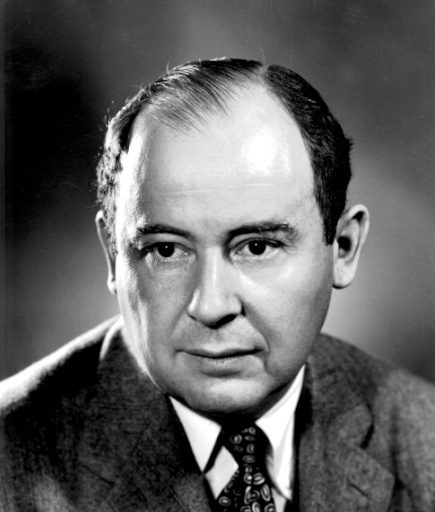
John von Neumann was born on December 28, 1903, in Budapest, Hungary. John (baptized as János) was readily recognized as a child prodigy, possessing an eidetic memory and at age 6 displayed the ability to divide two eight-digit numbers in his head. His family often entertained guests with demonstrations of his prodigious memory. The guests would randomly select a page from a telephone book for John to scan, and when he had committed a column of names and numbers to memory they would quiz him, and be astounded by his accurate recall. Throughout his life, John was able to recite verbatim pages of classical literature in Ancient Greek.
In 1911, at the age of 7 John entered the Lutheran Gymnasium, a prestigious school, where John’s prodigy was immediately recognized. He was given a special tutor and by age 8, he had become proficient in calculus. He graduated in 1921 and enrolled in chemistry at the University of Berlin. His interest in mathematics eventually resulted in his writing a dissertation on set theory for which he was awarded a Ph.D. from the University of Budapest at the age of 22. In 1928, he published his seminal paper The Axiomatization of Set Theory, and was one of the first to perceive the importance of Gödel’s completeness theorems.
Von Neumann’s eidetic memory enabled him to synthesize ideas from different domains, connecting his work in game theory, quantum mechanics and computer architecture. This broadened the scope of his research and enabled him to solve problems in disparate domains that appeared to others as having no connection.
During the 1930s, von Neumann lectured in mathematics in Germany, and between 1930 and 1933 at Princeton in mathematics and quantum physics. His remarkable memory enabled him to deliver his lectures with minimal notes, and precisely articulated expression. When walking through the halls of Princeton, students working on their doctoral dissertations, would often button-hole him for some help with their research. During his brief journey between destinations, he would listen to their struggle with a particular differential equation and suggest how they could proceed to find a solution. Several students reported that von Neumann was remarkable in his ability to understand the difficulty immediately and prescribe an approach that inevitably solved the problem.
In 1933, von Neumann became one of the original six members of the newly-created Institute for Advanced Study at Princeton, where he would be able to devote himself entirely to his research for the remainder of his life. An oft-told story that sheds light on von Neumann’s prodigious calculating ability emerged during his work on the Manhattan Project.
In 1943-44, John Mauchly and Presper Eckert, built the ENIAC3 computer at the University of Pennsylvania. It spanned an area of 20 feet × 40 feet with circuitry that incorporated 18,000 vacuum tubes. John von Neumann had modified the ENIAC computer to make it programmable, so Robert Oppenheimer, the Director of the Project, engaged von Neumann to use the computer to calculate the height at which the atomic bomb should be detonated to exact maximum damage. Time was tight and the race to develop the bomb was heating up. “Johnny,” as he was addressed by his friends and colleagues, was revered for his brilliant computing power, and had done the calculations by hand, arguing that the Project could not afford to wait a week or two for the computer to verify his calculations. However, Oppenheimer overruled him, and everyone waited impatiently as the computer chugged through the extensive calculations. It was the middle of the night when the computer yielded its final output. The excited scientists waited until after 10:00 a.m. to telephone von Neumann, to share the good news, because everyone knew that von Neumann was a late sleeper. The conversation is reported to have unfolded something like this:
Von Neumann (sleepily answering the telephone): Johnny here.
Scientist: Dr. von Neumann, the computer has finished its calculations and they verify that your computations are correct!
Von Neumann: You wake me up early in the morning to tell me that I’m right? Please don’t call me when I’m right; call me when I’m wrong! (and hangs up!)
Johnny von Neumann was a brilliant mathematician and scientist, but when awakened before noon, he could be a cranky person.
